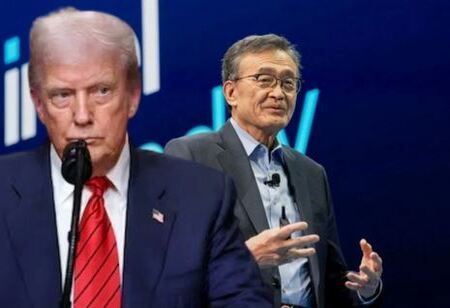
Trump Urges Intel CEO to Step Down, Calling Him 'Conflicted'


In an effort to stop losses and maintain relevance in the era of artificial intelligence, President Donald Trump called for the resignation of Intel Corp.'s CEO due to what he saw as conflicts of interest.
He provided no proof or any information about the specific conflicts of interest that Intel CEO Lip-Bu Tan might have.
The tweet was made in response to queries Republican Senator Tom Cotton posed to Intel's board chairman this week regarding Tan's connections to China, including investments in Chinese semiconductor firms and other individuals with military ties.
Cotton inquired about Tan's Chinese interests prior to his appointment as Intel's CEO in a letter to Frank Yeary, who is in charge of the chipmaker's board of directors. Cotton also raised particular concerns regarding Tan's affiliations with Cadence Design Systems Inc., a technology company that Tan oversaw for more than ten years and that supplied goods to a military institution in China. In July, the business entered a guilty plea to providing software and hardware to China's National University of Defense Technology in violation of US export regulations.
Also Read: How Tensions Grew Worse between Elon Musk and Donald Trump
In New York, Intel's stock dropped 3.1percent to $19.77 on Thursday, wiping up a little 2025 gain.
The Wall Street Journal stated that although the board has supported Tan, there have been some conflicts behind the scenes.
According to the publication, the CEO and certain directors have disagreed about whether the company should leave the manufacturing sector, with Tan hoping to keep Intel together. According to the Journal, some board members also resisted Tan's attempts to raise money and purchase an AI business.
Tan, a 65-year-old venture capitalist and technology industry veteran, assumed leadership of Intel in March after his predecessor was fired. Tan was chosen by the company's board to revive the venerable chipmaker after it lagged behind competitors in recent years.
A key component of Washington's initiatives to revive the homegrown semiconductor sector has been Intel. The business received the largest grant of any corporation, about $8 billion, under the Chips and Science Act for US investments, including a plant to supply the US military. The funds were ready to support Intel's expansion of its network of factories, which would be anchored by a massive new location in Ohio.
Also Read: AI Prowess of Zoom Docs Capable to Compete with Google, Microsoft?
However, given its financial limitations, Intel has a hurdle as the Trump administration attempts to utilize the Chips Act awards to encourage businesses to pledge more investments. It's unclear how Tan's budgetary approach will impact those honors.
Tan's prior investments in China have put him in the public eye. In 2023, he received a letter from the House Select Committee on the Chinese Communist Party expressing "serious concern" and asking for details regarding Walden International, his investment company, and its operations in the Asian country.
In the meantime, international chip manufacturers are increasing their US investments. In addition to its initial commitment of $65 billion, TSMC announced in March that it would invest an extra $100 billion in the nation. Samsung Electronics Co. of South Korea is likewise making investments in US chip manufacturing facilities.